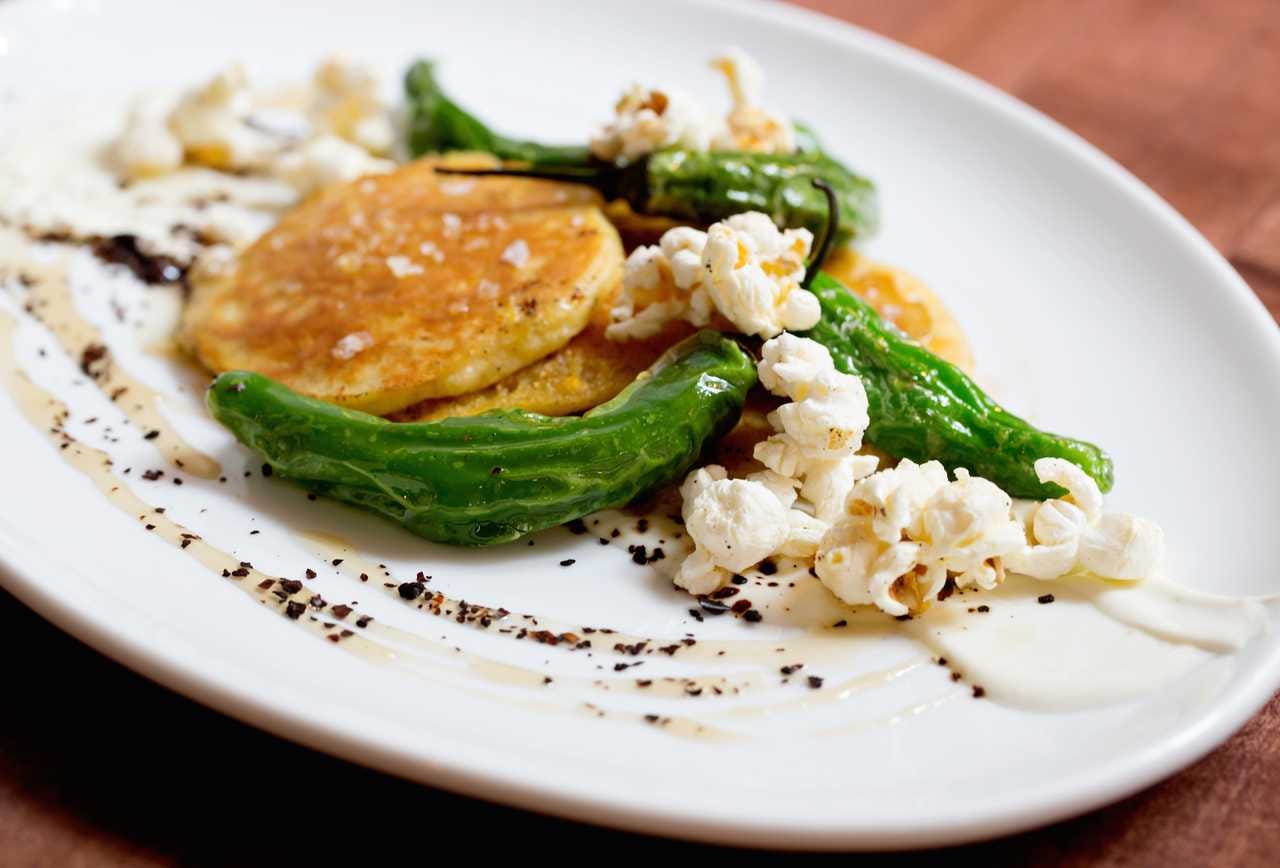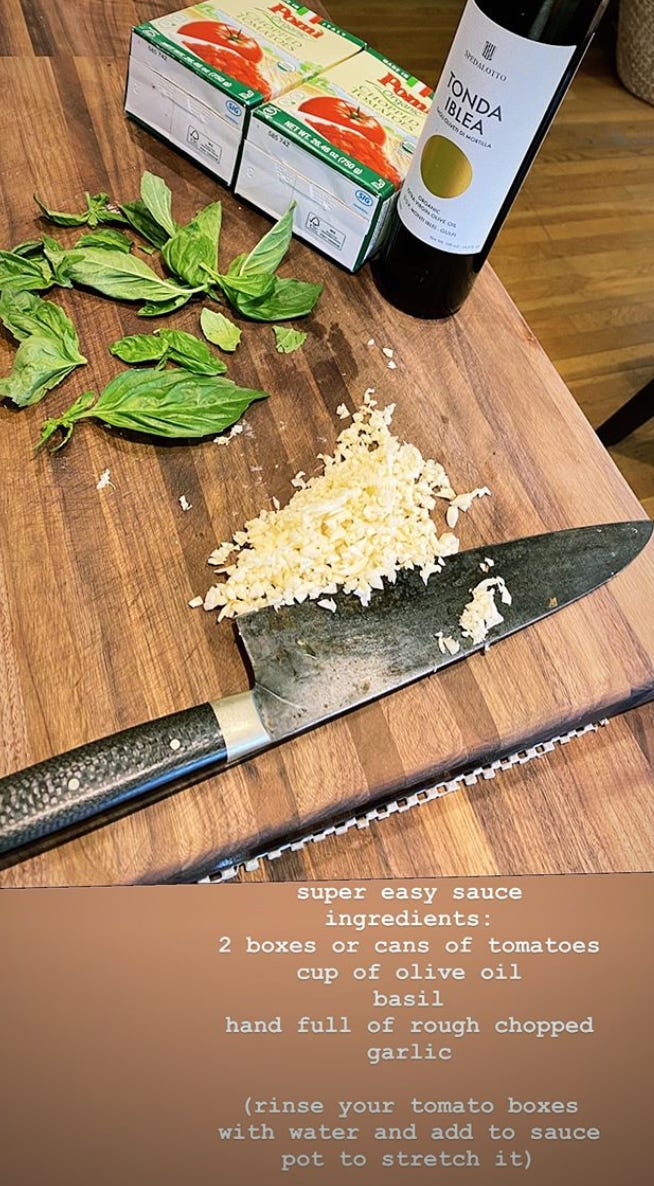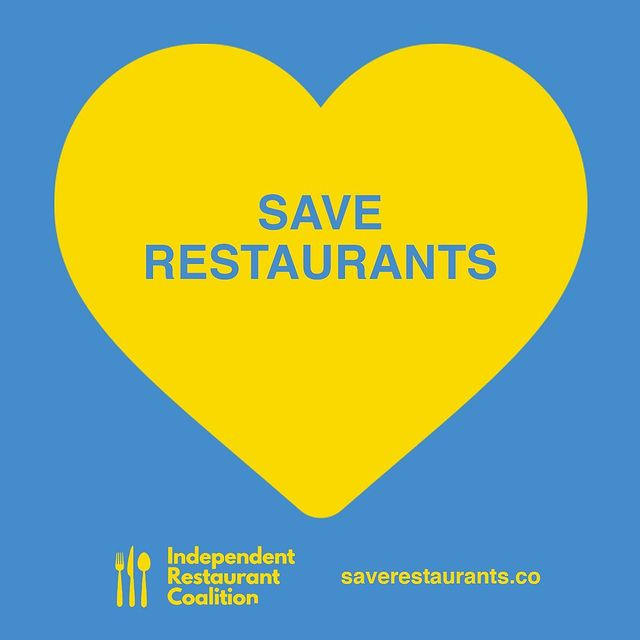How to Make Corn Pancakes, How to Meal Plan, and How To Support The Restaurant Industry, with Michael Scelfo
Oh my god, he really shared the pickled corn pancake recipe.

When you’re born in New York, you swear on oath to fulfill a few sacred duties: Thou shalt not compliment any other city’s bagels. Thou shalt not walk slowly. And thou shalt not say even a kind word about Boston.
I have lived my life by these commandments, especially the last one. I will be the first to tell you there’s more to do on most blocks in Manhattan there is in all of Downtown Boston; the F train, alone, has more character than the MBTA; and Bill Belichick definitely deflated those footballs.
But despite my piety to New York, there are two exceptions to my belligerence toward Boston. The first is David Ortiz’s “This is our fucking city” remarks, which, in my professional opinion, deserve a place in the pantheon of great orations next to The Gettysburg Address and Dr. King’s “How long? Not long” speech.
Which brings me to the second exception to my disdain for Boston, Michael Scelfo, who not only runs three of my favorite restaurants in the world—Alden and Harlow, Waypoint, and Longfellow Bar—but is also one of the kindest dudes around.
If you’ve never had his squid ink gemelli or his root vegetable latkes with honey roasted figs or his take on pigs n’ blankets, it’s hard to capture just how fucking delicious his food is in writing.
Editor’s note: LOOK AT THESE PIGS N’ BLANKETS:
But I do hope our interview gives you a sense of how generous, decent, and wise Michael is—and inspires you to do everything you can to support restaurants like his when they need it most.
He shared great tips on how to cook, stretch meals, and plan ahead during quarantine. He’s also been posting recipes of the food he’s been making on Instagram, so as soon as you’re done reading this newsletter, you should follow him there to learn how to cook dinners that look like this:
This was one of the most engaging conversations I’ve had since starting this newsletter—and I hope you dig it, too.
But first, I have big news: Michael shared the recipe for his legendary pickled corn pancakes, which was originally written by his mom. When he texted it to me, I told him I felt like I was Nicholas Cage stealing the Declaration of Independence. But unlike our founding document, this recipe lives up to the promises it makes.
This dish is the best, and I am going to make it tonight. You should, too.
HOW TO MAKE PICKLED CORN PANCAKES

Ingredients:
-Yellow Corn Grits, 4 cup
-Cornmeal, coarse grind, 4 cup
-AP Flour, 6 cup
-Kosher salt, 6 TBSP
-Baking powder, 3 T
-Baking soda, 3 T
-Grapeseed oil, 1/2 cup
-Buttermilk, 10 cup
-Black pepper, ground to taste
-Pickled corn, 4 cup (Note: Regular canned or frozen corn soaked in vinegar over night will work too.)
-Honey, 3 T
Method: Mix dry ingredients. Add wet and mix well, make sure there are no lumps. Allow to rest 15-20 minutes to hydrate the flour.
Heat butter in pan and drop dollops of batter in, cook like traditional pancakes
Why meal planning is so important
Michael: I think meal planning right now is huge. People should be thinking about their budgets, thinking about what they need to get through for a week, week and a half.
Write out exactly what you’re going to make for dinner each day and then just have enough on hand to cover that, and then whatever incidentals you have. And that'll go a long way to stretching food for everyone across the board, and kind of controlling and keeping people from just kind of hoarding and overstocking on stuff.
Editor’s Note: In addition to chicken stock and tomato sauce, which Michael talks about more below, Michael told me that people who are meal planning should be cooking frittatas, macaroni casseroles, and pork shoulder roasts—and stir-frying leftovers into brown rice. Those are dishes, he says, that can last for days and can be transformed in all sorts of interesting ways.
He’s also been grilling vegetables, which he then repurposes:
What meals you can stretch
Michael: If you do a chicken with carrots and vegetables and make a nice broth, you can get three or four meals out of that. You can pull the meat off the bone and shred it and make a salad. You can take the vegetables out and chop them up and put them back in the broth and throw in a little pasta and make a soup out of it. You know, you can use that stock to make other things at home. So I think that's a great one.
READ: Michael Symon shared his tips for how to roast a chicken in one of last week’s newsletters.
You can also make a simple tomato sauce, very classic. I’m thinking about the kind of things that my mom made when we were kids, that we got meals out of over the course of a week. Those are the kind of things, you know, classic old school comforts that'll last a while, that you can turn into several meals. I think you got to kind of think like that right now.
Editor’s Note: Michael saved an Instagram Story to his profile, where he posts step-by-step instructions for how to make his tomato sauce. Here are the ingredients:

You should watch the entire “Meal Ideas” Instagram Story saved to Michael’s profile, where he’s constantly demonstrating how to make meals like this:
How to make magic out of the stuff in your pantry
Michael: Vinegar and lemons and acid of any kind is going to be your friend right now. You can use it to jazz up whatever you have in your pantry right now. If you've got beans and tuna and canned vegetables that you haven't used in a while, make a salad out of that. Dress it with some olive oil and some lemon juice and some dried oregano out of the cupboard and a little red pepper flake and some salt.
Toss it together and let it hang out on the counter for 30 minutes, and it's a nice salad.
Look, we're all doing what we have to do in our own respective ways right now. So do the best you can with what you have and try to make magic out of those things that have been sitting there.
How Michael is supporting his staff
Michael: My restaurant went from a full service restaurant to a food rescue for my low-income and food-insecure staff in a matter of hours. We immediately took all of our perishable product and started to reorganize it. We continue to do this, trying to think in terms of rationing. We made spreadsheets for our staff members to tell us, “Hey, what do you need to navigate the next month?” Like, “What does your family need? Is it diapers, tampons, formula, toilet paper?”
You know, eggs, milk, rice, vegetables, whatever we could do. So we started making these packages up and handing them out. Luckily, we were sitting on industrial-sized cases of toilet paper. We had hundreds and hundreds of rolls at each restaurant that we could divvy up and give to people, because you can’t get it in the store right now. Which is just crazy, you know?
So that's what we've been doing. We’ve also had some small Venmo funds and reduced gift card sales to contribute and offset the cost of this. But my mission now is to just kind of carry my team through this as best as I can, and hopefully navigate it and get us to a point that we can reopen.
Why the government needs to bail out restaurants
Michael: The problem is that it's very clear at this point that restaurants are not going to reopen for most of us in this industry without some type of federal or state-level support or bailout. There's just no way that everyone's going to be able to pony up the resources it's going to take. It's very expensive to reopen, rehire all these people, retrain people, get your restaurants back up and running—assuming your landlord is being cooperative. Not every landlord is being cooperative right now. Landlords are a finicky bunch, to put it kindly.
We’re going to need a lot of help. So now my attention is turning to how can I get senators and local politicians here to fast-track programs that are, in my opinion, inevitable.
If we bailed out Wall Street, if we're talking about a bailout for a cruise industry that has about a quarter of a million employees total—compared to the restaurant industry, which has about a twenty to twenty-five million people workforce—let’s be real: Something is going to have to be done.
We need a hard focus on insurance companies. We need the federal government to leverage them—and say, “Look, we are going to federally back you on honoring business interruption claims.” If they do that, I think most of this is survivable.
I'm sure the politicians are hearing from the insurance company lobbyists that are in their pockets that, you know, “You're gonna tank our industry if you honor this,” just like they said with mortgage backed securities. But we bailed them out then, so everyone didn't lose their house. This is the equivalent of losing your house, en masse, across the country. In an even worse way, because our house generates incomes for hundreds and hundreds of people.
So that's kind of where we're at. It's not great news. But, you know, I'm oddly optimistic that we're gonna get there.
What you can do right now to support restaurants
Michael: First and foremost, call your local congressman and senators and public officials at any level right now to advocate on behalf of the restaurant industry.
Editor’s Note: Call the capitol switchboard at (202)-224-3121.
I would also say, find your favorite restaurant that you enjoy supporting on a regular basis—and buy some gift cards from them, buy some merchandise from them. A lot of restaurants have set up Venmos for their staffs to have their income supplemented. We’ve done that for our staff and it's being run by our staff itself.
Editor’s Note: If you want to support Michael’s staff, Venmo them here: @LF-AH-WPstaff.
One fun thing we did is we asked people to post their favorite moments or favorite dishes from their favorite restaurants onto Instagram. I got some really touching posts. Someone out of Seattle texted a friend a picture of pickled corn pancakes they tried to make for their home quarantine meal the other night. And it actually looked pretty good. I might hire that person.
WHY ARE SO MANY PEOPLE LINING UP OUTSIDE CARBONE?
Eater reported that the police had to be called (twice!) because so many people were waiting outside Carbone for delivery. I like (genuinely excellent) overpriced rigatoni as much as the next guy, but there are SO MANY restaurants that really need your help right now. So don’t force your Caviar courier to stand next to 100 other couriers on Thompson Street and become a vector of COVID-19—all because you and your other I-banker friends want super sized veal parm.
Order L’Artusi instead, and donate the $50 you save on dinner to the Restaurant Workers’ Community Fund.
Cool? Cool.
Homecooking Hacks: GO TO H-MART
A VERY IMPORTANT PSA from my friend Adam Farina, who’s one of the best writers I know and one of my favorite humans, even though he, too, is from New England:
Twitter is usually not the best place to go for advice on, well, anything—but this tweet that went viral last week advocating for people to support their local asian supermarkets is a notable exception. My girlfriend and I went to our favorite H-Mart on Sunday, and not only was it nearly empty during peak hours, but we got everything we needed, from hot pot ingredients to onions to toilet paper, and left without waiting in line for more than a minute. On the way home, we passed our local Whole Foods (which, as far as I can tell, hasn’t carried an onion in at least 10 days) and its line stretched down the street.
Trump’s racism during this pandemic has led to increased physical and verbal attacks against Asians, and, at least anecdotally, kept people away from Asian restaurants and supermarkets alike. Unfortunately, we can’t vote against him for another 8 months—so, in the meantime, I encourage you to join me in fighting his racism by voting H-Mart.
At least three friends have verified Farina’s reporting: While supermarkets around the country have empty shelves, H-Mart is FULLY STOCKED. Don’t be racist. Go to your local Asian supermarket. Thank me later.
Until next time...







